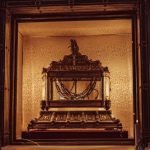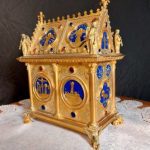 History
History  History
History  History
History 10 “Modern” Problems with Surprising Historical Analogs
 Health
Health 10 Everyday Activities That Secretly Alter Consciousness
 History
History Top 10 Historical Disasters Caused by Someone Calling in Sick
 Animals
Animals 10 New Shark Secrets That Recently Dropped
 Movies and TV
Movies and TV 10 Forgotten Realities of Early Live Television Broadcasts
 Technology
Technology 10 Stopgap Technologies That Became Industry Standards
 Weird Stuff
Weird Stuff 10 Wild Facts About Taxidermy That You Probably Didn’t Know
 Travel
Travel 10 Beautiful Travel Destinations (That Will Kill You)
 Miscellaneous
Miscellaneous 10 Modern Marriage Rituals Born from Corporate Branding
 History
History 10 Extreme Laws That Tried to Engineer Society
 History
History 10 “Modern” Problems with Surprising Historical Analogs
 Health
Health 10 Everyday Activities That Secretly Alter Consciousness
Who's Behind Listverse?

Jamie Frater
Head Editor
Jamie founded Listverse due to an insatiable desire to share fascinating, obscure, and bizarre facts. He has been a guest speaker on numerous national radio and television stations and is a five time published author.
More About Us History
History Top 10 Historical Disasters Caused by Someone Calling in Sick
 Animals
Animals 10 New Shark Secrets That Recently Dropped
 Movies and TV
Movies and TV 10 Forgotten Realities of Early Live Television Broadcasts
 Technology
Technology 10 Stopgap Technologies That Became Industry Standards
 Weird Stuff
Weird Stuff 10 Wild Facts About Taxidermy That You Probably Didn’t Know
 Travel
Travel 10 Beautiful Travel Destinations (That Will Kill You)
 Miscellaneous
Miscellaneous 10 Modern Marriage Rituals Born from Corporate Branding
10 Freaky Times When Famous Body Parts Were Stolen
When somebody dies, it is common for people to wish that they “rest in peace.” But while they might say these words, they do not always mean them. Bodysnatchers who sold corpses to satisfy scientists’ curiosity are one example. Grave robbers are another. In many cases, those disturbing the dead were poor and desperate.
Throughout history, however, people have found many other reasons not to let the dead lie, especially if the dead are famous. Unable to raise any objection, several of history’s celebrated figures have had body parts stolen from them after death. They have sometimes been returned, but many have disappeared entirely. Here are ten of the most freaky cases of famous stolen body parts.
Related: 10 Disturbing Facts About the Victorian Dead Body Trade
10 Haydn’s Head
When the composer Joseph Haydn died in Austria in 1809, he was one of the most prominent musicians in Europe, if not the biggest star of his day. While there was great public sadness at his loss, an ongoing war meant that he was buried quickly without the sort of grand ceremony that would have befit his status. But his resting place just outside Vienna was only intended to be temporary. Haydn’s employer, Prince Nikolaus Esterházy, planned to move the composer’s body to a nicer tomb.
When the prince finally got around to it more than a decade later, he was shocked to open Haydn’s grave and find that there was no skull. Someone had stolen Haydn’s head. All that remained was the powdered wig that should have sat on top of it.
Surprisingly, his head had been removed and taken by admirers who wanted to measure it. They were caught, but they refused to give back the real skull. Creepily, they had other skulls which they tried to claim were Haydn’s. The real skull was eventually reunited with Haydn’s body in 1954, 145 years after his death.[1]
9 Galileo’s Fingers
It would take more than twice Haydn’s 145-year wait for the fingers of this famous Italian astronomer to turn up. But unlike Haydn, whose head was stolen before he was moved to his tomb, three of Galileo’s fingers and a tooth were taken while his body was being transferred to a sarcophagus in Florence in 1737. He had died almost a century earlier, in 1642, but was initially buried quietly because the church did not wish to celebrate somebody that they saw as a heretic.
Later, however, the church’s influence would wane under the Medicis, who constructed the “Monumental Tomb of Galileo Galilei” to recognize the astronomer’s achievements. Given his former reputation as a heretic, it is ironic that the people who stole Galileo’s fingers took them for much the same reason that religious folk used to take body parts from saints. They wanted to keep a part of a hero.
At some point, one of the fingers was separated and ended up in a science museum in Florence. In 2009, it would be joined by the rest after they turned up at an auction, carefully stored inside a glass jar.[2]
8 Mary Magdalene’s Hand
Had Galileo been declared an actual saint, and had he lived between the ninth and twelfth centuries, then his admirers’ bizarre behavior would not have been surprising at all. In fact, competition for relics at that time was so fierce that monasteries regularly stole them from each other. There were even professional relic dealers.
Relics were a lucrative and important business; the right ones would bring pilgrims and prestige to a monastery or church. Moreover, the theological belief that “the whole was in each part” meant essentially that even the tiniest fragment of a saint’s body possessed all of that saint’s power.
This led to incidents like Bishop Hugh of Lincoln’s visit to the Abbey of Fecamp in 12th-century France. The monks there possessed what they said was the hand of St. Mary Magdalene, who had actually known Jesus. The English bishop reportedly bent down as if to kiss the hand but, at the last second, bit a chunk out of it with his teeth to take home with him.[3]
7 Louis XIV’s Heart
In 1715, Louis XIV died after a lifetime indulging in large banquets. He almost made it to 77 years of age, but his love of food had caught up with him. He was severely overweight with a gangrenous leg that may have resulted from Type 2 diabetes. As had been the tradition for deceased French kings, his body was separated into three parts: heart, body, and entrails.
His stomach was reportedly twice the size of an average human’s. But this is not to say that he would have appreciated one of his organs becoming a meal. His heart, which had been embalmed after his death and was kept at a Jesuit church in Paris, was stolen during the French Revolution and eventually came into the possession of the Archbishop of York.
In 1848, the Archbishop was visited by William Buckland, a man with varied scientific and theological interests, one of which was strange foods. He claimed that he would eat a piece of every animal, and knowing that his host had Louis XIV’s heart, he took the opportunity to knock humans off his list of things to try.[4]
6 Oliver Cromwell’s Head
Louis XIV was not the only dead king to be disturbed by the French Revolution. James II died while exiled in Paris in 1701 and was dissected like Louis. Some of his intestines were sent to a church in the suburbs of Paris. Still, when revolutionaries attacked the churches in 1789, it was thought that all trace of the last Stuart king was lost. However, his intestines were rediscovered when the church was demolished and rebuilt in 1824.
James had been exiled for trying to restore absolute monarchy in the British Isles, but there was to be no return to that after Oliver Cromwell had defeated the monarchy in the English Civil War. Although not a monarch, as head of state, Cromwell was first buried in Westminster Abbey. But following the restoration of the monarchy, royalists dug up his body.
At first, they hung it from scaffolding. It was later decapitated, and his head was displayed on a spike. The body was never seen again, but Cromwell’s head passed through many owners over the years. At one point, it even became part of a traveling show. It was only reburied shockingly recently, in 1960, at the University of Cambridge.[5]
5 George Washington’s Dentures
Okay, so George Washington’s dentures were not technically part of his body. However, they might have contained a few bits of other people’s. Human and animal teeth were commonly used to make dentures during the first U.S. president’s lifetime. Washington had already lost all his teeth by the time he became president, and he would go through at least six sets of dentures in his remaining lifetime.
The set which ended up being stolen also contained ivory and gold. Something his false teeth were never made from, contrary to popular belief, was wood. They were, however, uncomfortable and unsightly, making it look as though his cheeks were puffing out.
In 1981, a set of Washington’s dentures were stolen from the National Museum of American History in what appeared to be an inside job. While they had previously been displayed in a dental exhibit, shortly before they were stolen, they were moved to a locked storage room for safekeeping amid a spate of thefts. Bizarrely, the lower half of the dentures turned up again in one of the museum’s storerooms almost a year later.[6]
4 JFK’s Brain
The last known sighting of JFK’s brain was inside a stainless-steel, screw-top container inside the National Archives. Following his autopsy, President Kennedy’s brain made its way there smoothly and safely, having been briefly stored in a filing cabinet and an evidence locker. It was nearly three years later, in October 1966, when the discovery was made that the brain and other materials from the autopsy had vanished.
In the five decades since then, nobody has figured out who took it, where they put it, or why. The lack of answers has, of course, contributed to the many conspiracy theories surrounding the assassination. Some have claimed that the brain was stolen to cover up the fact that Kennedy had been shot from the front and not the back. Others have speculated that the president’s brother, Robert Kennedy, took the brain to stop people from finding out that JFK was very ill or that he was taking many medications.[7]
3 Stalin’s Body
While Joseph Stalin’s body was kept intact and its whereabouts have always been known, it was moved from its original burial site, the one that he had demanded. That site was on public display beside the body of Vladimir Lenin, the founder of the Soviet Union and leader of the Bolshevik Revolution in 1917. Using various chemicals and an electric pump to control humidity, Lenin’s body has been preserved behind glass since his death in 1924.
Stalin wanted the same for himself, and he got it for a while. When he died in 1953, much of the public still saw him as the hero who had led them to victory in World War II. But when the Soviet Union came under the rule of Nikita Khrushchev, the new leader began the process of “de-Stalinization.”
Khrushchev revealed Stalin’s atrocities and brought down his reputation, eventually persuading the Soviets that the despot’s body should not be honored like Lenin’s with a public display. It was removed from Lenin’s tomb in 1961 and reburied a short distance away with other minor leaders of the country.[8]
2 Kurt Cobain’s Ashes
Given the name of his band, it seemed appropriate when Nirvana frontman Kurt Cobain’s ashes were scattered at a Buddhist temple following his death in 1994. At least, that was where some of them went. Another portion of his ashes were scattered in the Wishkah River in Washington, and what was left apparently ended up inside a handbag shaped like a pink bear.
The bag was kept inside a closet by Cobain’s wife, Courtney Love, until June 2008, when she claimed a friend had stolen it. But this was only the first part of this strange tale. A few months later, an Australian artist, Natascha Stellmach, claimed she had the ashes. She refused to explain how she had gotten them, other than to say that it was “kind of magic,” but she explained how she planned to smoke them.
According to her website, she invited six volunteers to join her in doing so, but the act was carried out in private and never documented. However, there is one final twist to this creepy tale. A spokesperson for Courtney Love then claimed that Cobain’s ashes were never taken at all.[9]
1 Blackbeard’s Skull
He only spent a few years plundering ships, but there is no other pirate whose posthumous reputation has endured quite like Blackbeard’s. There is surprisingly little evidence that he was violent, but he certainly was during his final battle against the British naval force of Lieutenant Robert Maynard in 1717. Before the fight, Maynard explained how he intended to return to shore with Blackbeard dead or alive.
Blackbeard would not come willingly and said he would “neither give nor take quarter.” The navy gave him none, tricking him into boarding their ship and shooting him at least five times. Blackbeard’s head was removed and hung from the bowsprit of Maynard’s ship as he sailed into Virginia. The governor there then had it mounted on a pike, and this is where the story becomes strange.
When it was eventually taken down, Blackbeard’s skull was said to have been plated with silver, and several owners over the coming centuries used it as a punch bowl. These included a Williamsburg tavern, dinner party hosts in the area, and even a fraternity. What is thought to be the skull is now reportedly locked away in a Massachusetts museum.[10]








